Visceral Oncology Center
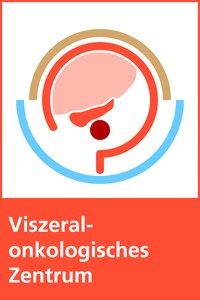
Dear relatives and visitors,
Optimum treatment of patients with cancer calls for top-quality medical care and continuous updates and adaptations to therapy in line with the latest standards and research results.
The Visceral Oncology Center was founded in 2013 to meet this demand. It is part of the National Center for Tumor Diseases Dresden (NCT/UCC), which has been funded by Deutsche Krebshilfe since 2007 as an Oncological Center of Excellence for the treatment of cancer.
The Visceral Oncology Center fulfills the quality criteria set by the German Cancer Society (DKG) and is a DKG-recommended visceral oncology center. In addition, the Visceral 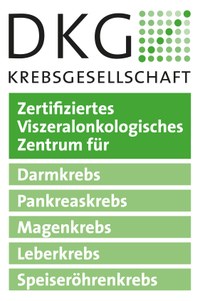
An individual treatment plan is created for all patients of the Visceral Oncology Center, which is coordinated between the surgery (surgical treatment), gastroenterology, oncology (drug treatment), radiotherapy, radiology, nuclear medicine and pathology departments according to the latest findings and research results.
Every cancer patient hase their case discussed by the above-mentioned specialist disciplines in the tumor board of the Visceral Oncology Center, which meets three times a week, and draws up an individually coordinated, interdisciplinary therapy proposal for the patient. For many patients, complete surgical removal of the tumors can now be achieved, often using minimally invasive, sometimes robot-assisted surgical techniques, which are associated with faster recovery.
Close outpatient care and aftercare is provided via specialized consultation hours for the individual diseases at NCT/UCC Dresden, the Clinic and Polyclinic for Visceral, Thoracic and Vascular Surgery (VTG) and Medical Clinic 1 (MK1).
The following pages provide general information about the Visceral Oncology Center, our range of services, treatment procedures and the various consultation hours. If you have any further questions, please do not hesitate to contact us directly.
Yours sincerely
PD Dr. med. Johanna Kirchberg
Prof. Dr. med. Gunnar Folprecht
Consultation hours
Here you will find an overview of our consultation hours. Please note the information on which documents you should please bring with you at your first appointment.
General surgical consultation hours
Monday to Friday from 8:00 a.m. - 4:30 p.m.
Portal building house 31C, ground floor
+49 (0)351 458-4500
Special surgical consultations (pancreas, colon and rectum, liver and gall bladder, stomach, esophagus)
Monday to Friday 8:00 a.m. - 4:00 p.m.
House 59, ground floor
+49 (0)351 458-883200
Outpatient Clinic Hematology/Oncology and Day Hospital
Monday to Friday 8:00 a.m. - 11:00 a.m. and 2:00 p.m. - 4:00 p.m.
Portal building house 31C, 1st floor
+49 (0)351 458-2583
Please call us if you have or are suspected of having a gastrointestinal tumor.
Which documents are required for the first appointment?
Medical records
- Laboratory tests
- Tissue findings (histology, cytology)
- X-ray examinations
- Findings from computer tomography examinations
- Findings from magnetic resonance imaging examinations
- OP reports
- Physician's letters
Letter of referral
A letter of referral is necessary.
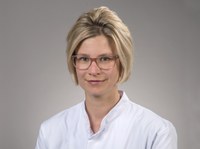
Dr. med. Johanna Kirchberg, FEBS
- Head of the Visceral Oncology Center
- Managin senior physician at the Clinic and Polyclinic for Visceral, Thoracic and Vascular Surgery
- Specialist for visceral surgery, additional training in special visceral surgery

Prof. Dr. med. Gunnar Folprecht
- Head of the Visceral Oncology Center
- Head of Oncology Department - Medical Clinic 1
- Specialist in Internal Medicine, Hematology, Oncology and Palliative Medicine

General
- Guideline-compliant diagnostics, therapy and aftercare
- Individual treatment plan adapted to the needs of the patient
- Implementation of the latest research and treatment methods
- Review of treatment options within clinical studies
Diagnostics
- Sonographic and endoscopic examinations
- Highly specialized nuclear medical examination procedures
- Computed tomography (CT) and magnetic resonance imaging (MRI)
- Positron emission tomography (PET-CT)
Therapy
- Highly specialized surgeons with many years of experience
- Ultra-high-tech surgical equipment
- Oncological surgery including minimally invasive techniques
- DaVinci system
- Surgical intensive care unit with experienced team of physicians and nurses
- Highly specialized medical specialists with many years of experience in oncology
- All aspects of individual drug treatment, primary and postoperative
- Professionally trained nursing team with additional training in oncology
Counseling, support and therapy-accompanying services
- Psychosocial/oncological care: Support in coping with the disease through discussions and assistance as patients adjust to altered circumstances
- Nutritional counseling
- Tertiary prevention offers via the Prevention Center of the National Center for Tumor Diseases
- Second opinions
The Visceral Oncology Center consists of a group of experts from a wide range of disciplines, whose goal is to provide optimal care for patients with tumors of the gastrointestinal tract, esophagus, liver or pancreas through standardized diagnostics, therapy, and follow-up care. Successful treatment of these tumors must be interdisciplinary and individually adjusted to the patient. Accordingly, all patients presenting at the Visceral Oncology Center are discussed in the interdisciplinary tumor board, which meets three times a week, together with representatives from surgery, pathology, radiology, gastroenterology, internal oncology and radiation therapy. Other specialist disciplines, e.g. nuclear medicine or orthopedics, are invited as needed. The tumor board produces a patient-specific therapy concept that takes into account national and international standards as well as current studies. This therapy concept is binding for all participants.
Below you will find an overview of the treatment and cooperation partners of the Visceral Oncology Center:
|
Work section |
Cooperation partner |
Contact |
|---|---|---|
|
Clinic and Polyclinic for Visceral, Thoracic and Vascular Surgery |
Clinic and Polyclinic for Visceral, Thoracic and Vascular Surgery Director: Prof. Dr. med. J. Weitz |
Dr. med. J. Kirchberg |
|
Radiology |
Institute and Polyclinic for Radiological Diagnostics Director: Prof. Dr. med. R.-T. Hoffmann |
Dr. med. V. Plodek |
|
Nuclear medicine |
Clinik and Polyclinic for Nuclear Medicine Director: Prof. Dr. med. J. Kotzerke |
Prof. Dr. med. J. Kotzerke |
|
Internal medicine |
Directors: Prof. Dr. med. M. Bornhäuser Prof. Dr. med. J. Hampe |
Prof. Dr. med. G. Folprecht |
|
Radiotherapy and radiooncology |
Clinic and Polyclinic for Radiotherapy and Radiooncology Directors: Prof. Dr. med. M. Krause / Prof. Dr. med. E. Troost |
Prof. Dr. med. E. Troost |
|
Pathology |
Director: Prof. Dr. med. G. Baretton |
Prof. Dr. med. G. Baretton |
|
Gastroenterology |
Directors: Prof. Dr. med. M. Bornhäuser Prof. Dr. med. J. Hampe |
Dr. med. S. Brückner |
The interdisciplinary treatment team includes other cooperation partners from the medical field as well as from support services such as occupational therapy, speech therapy, social services, psycho-oncology and counselling, with whose help we sre able to offer you and your relatives the best possible support during the entire treatment process.
|
Work section |
Cooperation partner |
Contact |
|---|---|---|
|
Anesthesia |
Clinic und Polyclinic for Anesthesiology and Intensive Care Therapy Director: Prof. Dr. med. T. Koch |
Prof. Dr. med. T. Koch |
|
Pain Therapy |
Head: Prof. Dr. med. R. Sabatowski |
Prof. Dr. med. R. Sabatowski |
|
Palliative Care |
Director: PD Dr. med. U. Schuler |
PD Dr. med. U. Schuler |
|
Social Service |
Social Services at the Nursing, Service, Documentation Business Unit Head: Tom Seidel |
Frau Zeibig Frau Lammek |
|
Psychooncology |
Head: Dipl.-Psych. B. Hornemann |
Dipl.-Psych. B. Hornemann |
|
Stomatherapy |
Clinic and Polyclinic for Visceral, Thoracic and Vascular Surgery Director: Prof. Dr. med. J. Weitz |
Frau Michalczyk |
|
Nutritional counseling |
UKD Service GmbH |
Frau Körner Frau Gründer |
|
Pastoral care |
Pf. M. Leonhardi Pf. K. Wunderland Pf. Christoph Behrens Dipl.-Theol. P. Brinker |
You can find the organization chart of the Visceral Oncology Center here.
The Gastrointestinal Tumor Board of the Visceral Oncology Center meets three times a week. Independent (specialist) physicians and medical colleagues from other hospitals in the region can also present their patients in our interdisciplinary tumor boards and receive a therapy recommendation when all necessary examination results are available.
Gastrointestinal tumor board times
|
Mondays |
2:45 p.m. - 4:30 p.m. |
House 31c, ground floor, room 0.1111 |
|
Wednesdays |
3:00 p.m. - 4:45 p.m. |
House 31c, ground floor, room 0.1111 |
|
Thursdays |
3:00 p.m. - 4:00 p.m. |
House 31c, ground floor, room 0.1111 |
An overview of all tumor boards of the National Center for Tumor Diseases as well as the information for registration can be found here.
Contact and Information Center for Self-Help Groups Dresden (KISS)
The Contact and Information Center for Self-Help Groups Dresden offers support and advice to interested citizens and existing self-help groups. If you have questions about self-help or are looking for a suitable self-help group, please contact KISS:
KISS
Industriestr. 21
01129 Dresden
Phone: +49(0)351 4884999
www.dresden.de/de/leben/gesundheit/beratung/selbsthilfe.php
Working Group of Pancreatectomy Patients (AdP)
Contact for the Dresden Regional Group:
Regine Kunde
Phone: +49(0)351 8805160 (only available by phone)
Further information about the AdP can be found at www.bauchspeicheldruese-pankreas-selbsthilfe.de.
German ILCO
The self-help association for people with ostomies and colon cancer, and their families.
Chairman of the Saxony regional association: Sandra Röder
Phone: +49(0)36621 8679 or +49(0)176 99065166
E-Mail: sandra.roeder@ilco-kontakt.de
Further information about the Saxony regional association of the German ILCO can be found here.
The Visceral Oncology Center has been meeting the quality criteria set by the German Cancer Society (DKG) since 2014, and is a DKG-recommended visceral oncology center. In addition, the Visceral Oncology Center has a certified quality management system that meets DIN EN ISO 9001. The following tumor entities are certified within the Visceral Oncology Center:
- Colorectal cancer
- Pancreatic cancer
- Stomach cancer
- Liver cancer
- Esophageal cancer
Benefits of a certified center:
Center as network
The main feature of a certified center is that it is a quality-assured network that covers the entire treatment chain for a patient and meets high quality standards. This ensures that patients receive the best possible care according to the latest scientific criteria, from diagnosis through treatment (inpatient and outpatient) to aftercare. Cooperation within the network is visible, for example, in the interdisciplinary tumor board, in which patient cases are presented and discussed with all treatment partners.
Guidelines
Implementation of the S3 guidelines in the requirements catalogs of the certified centers is a central component of the certification system of the German Cancer Society´s certification system. he current evidence-based treatment recommendations from the guidelines are integrated in the requirements catalogs for the centers. Their application is monitored in annual audits.
Quality management/audits
Every year, qualified experts visit the center in person and check that the quality requirements are being met. The continuous review of the centers and the feedback from the dialog with the auditors enable continuous voluntary quality improvements at the center.
Decision support for patients
As a patient, you have to help make decisions about your treatment options after receiving detailed information from the physicians treating you. Clear and transparent explanation from a certified center can help you in this process. As a patient, you have access to a network of treatment partners and all participants have committed themselves to the quality requirements of the certified center. As a patient, you know that the "certified center" quality seal guarantees a high quality of treatment and that you will have access to specific qualified persons.
Specifically, certified centers
- offer early detection, diagnostics, therapy and aftercare under one roof
- cooperate across sectors, disciplines and professional groups
- deliver measurable quality based on key figures and indicators defined by the German Cancer Society
- are subject to an annual review against professional requirements by external independent assessments
- have kex figures and quality indicators based on specifications from the medical guidelines
- have optimal transitions and workflows between the various professional groups and disciplines
- establish common, clearly defined long-term and short-term goals that are regularly reviewed
- present all work processes and responsibilities transparently and systematically in a management manual
- use the management manual as the binding working basis for all employees that regulates cooperation with the participating facilities
- perform annual internal audits with all cooperation partners for the continuous development of the center
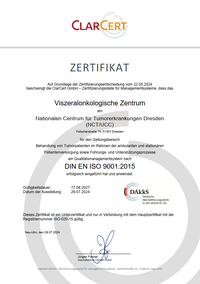
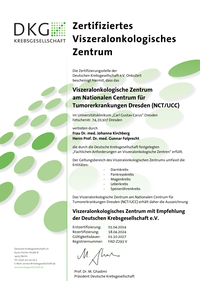
- Flyer Visceral Oncology Center (German)
Current events of the NCT/UCC Dresden can be found here.


